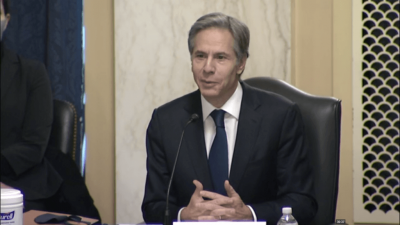Blinken Grilled for Maintaining Trump’s Sanctions on War Crimes Court

All Global Research articles can be read in 27 languages by activating the “Translate Website” drop down menu on the top banner of our home page (Desktop version).
***
Secretary of State Antony Blinken defended the Trump administration’s position on the International Criminal Court at a Wednesday congressional hearing and refused to say whether U.S. sanctions against war crimes investigators would be lifted.
Blinken told the House Foreign Affairs Committee that the Biden administration wants a “productive relationship” with the ICC, but echoed the Trump administration’s “concerns” about the Hague-based war crimes court attempting to investigate Israeli and U.S. troops.
“Are you saying there is legitimacy to the sanctions that were placed under Trump on the ICC?” Rep. Ilhan Omar (D–Minn.) asked.
“No, all I’m saying is that it’s something that is under review, and at the same time we have real concerns about some of the assertions of jurisdiction with which we disagree,” Blinken replied.
He declined to answer why the sanctions had not been lifted, or whether they would be lifted at all.
The Hague had angered the Trump administration last year by opening investigations into alleged war crimes by multiple sides — including U.S. and Israeli forces, as well as their opponents — in Afghanistan and the Palestinian territories. The investigation is also looking into the CIA’s alleged torture of prisoners captured in Afghanistan and rendered to third countries.
Then-Secretary of State Mike Pompeo responded by freezing the assets of two ICC prosecutors, Fatou Bensouda and Phasiko Mochochoko, and banning their family members from entering the United States.
“The Trump administration’s perverse use of sanctions, devised for alleged terrorists and drug kingpins, against prosecutors seeking justice for grave international crimes, magnifies the failure of the U.S. to prosecute torture,” Richard Dicker, international justice director for Human Rights Watch, said in a statement at the time.
The Trump and Biden administrations have maintained that the ICC lacks the jurisdiction to investigate Americans or Israelis, as neither country had ratified the Rome Statute, the treaty that established the court.
Afghanistan, however, is a signatory to the Rome Statute. So is the semi-autonomous Palestinian Authority, which the ICC recognizes as a state but the United States and Israel do not.
Blinken reaffirmed in a statement last week that the United States does not recognize Palestinian Authority as an independent state.
Israeli prime minister Benjamin Netanyahu has argued that the court’s ruling places Israel’s “heroic and moral” troops “under attack” and represents “the essence of antisemitism.” The Palestinian militant group Hamas, which is also under investigation for alleged war crimes, welcomed the ICC’s investigation.
The current standoff is not the first disagreement between a U.S. administration and the ICC.
The Clinton administration signed the Rome Statute in 2000, but the Bush administration reversed course soon after to the extent of threatening other countries that ratified the Statute with a cut-off in U.S. assistance. In 2002, then-President George W. Bush signed the American Servicemen Protection Act, also known as the “Hague Invasion Act,” which bans U.S. support to the ICC and authorizes the use of military force to free American citizens held by it.
The Obama administration took a middle path, adopting a policy of “positive engagement” with some ICC investigations while also attempting to exempt U.S. forces from prosecution.
The Biden administration seems to be framing its policy in similar terms.
“We of course share the goal — the broad goal — of international accountability for atrocity crimes. That’s not the issue,” Blinken said at Wednesday’s hearing. “We have the capacity ourselves to provide accountability.”
“We’ve spoken out, we’ve been clear, and we’ll see going forward how we can most effectively engage the ICC to avoid these assertions of jurisdiction when they’re not warranted,” he concluded.
*
Note to readers: please click the share buttons above or below. Forward this article to your email lists. Crosspost on your blog site, internet forums. etc.
Featured image: Tony Blinken At His Confirmation Hearing, Senate Foreign Relations Committee, Jan. 19, 2021. Screenshot.
via Mondoweiss

